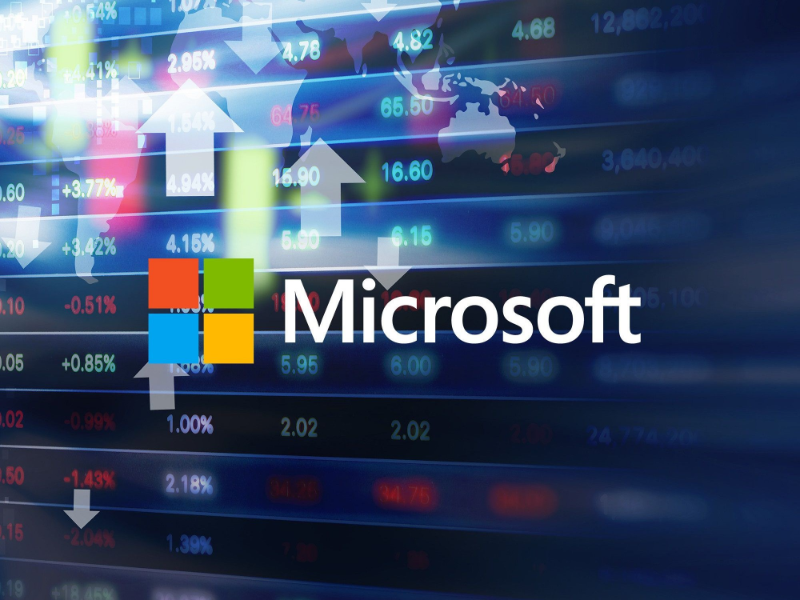- Investors anticipate Microsoft’s upcoming earnings report to assess the impact of its AI infrastructure investment on Azure’s growth.
- There is apprehension regarding the short-term returns on tech giants’ data centre spending, with Alphabet’s recent financial results serving as a cautionary example.
OUR TAKE
As the date for Microsoft to report its latest earnings draws near, investors and market analysts are watching closely to see if its investments in AI have begun to show results. Especially given Microsoft’s continued investment in its Azure cloud computing business and its partnership with OpenAI, people are looking forward to seeing how these investments translate into actual business growth and market competitiveness.
–Elodie Qian, BTW reporter
What happened
As Microsoft gears up to unveil its earnings report on Tuesday, investors are eager to ascertain whether the expansion of its Azure cloud-computing service justifies the substantial investment in AI infrastructure.
Microsoft, which has partnered with OpenAI, the creator of ChatGPT, is expected to report a consistent quarter-on-quarter growth of around 31% for Azure between April and June, in line with the company’s projections.
However, investors anticipate a more pronounced contribution from Microsoft’s AI ventures in the fiscal fourth quarter, especially considering its 7 percentage points contribution to Azure’s growth in the first quarter of the year.
Analysts polled by LSEG predict that Microsoft’s capital expenditure likely surged by approximately 53% year-on-year to £13.64 billion ($17.52 billion), significantly higher than the £10.95 billion ($14.07 billion) expenditure in the previous quarter.
This surge in spending is set against a backdrop of broader concerns about tech giants’ substantial outlay on data centres, which may not yield immediate returns, dampening the U.S. stock market’s enthusiasm for earnings growth.
Alphabet, the parent company of Google, saw its shares plummet by more than 5% last week following the disclosure of capital expenditure that exceeded estimates by nearly $1 billion.
The modest revenue boost from AI integrations triggered a sell-off among major tech companies. Alphabet’s CEO, Sundar Pichai, remarked that “the risk of under-investing in AI infrastructure is dramatically greater than the risk of over-investing.”
Also read: Windows is under new management due to Microsoft AI reorganization
Also read: Microsoft and Lumen forge $20M deal to boost AI infrastructure
Why it’s important
Microsoft insists that it must invest in data centres now to overcome the capacity constraints that are impeding its ability to capitalise on AI demand. This perspective is shared by other tech companies, including Alphabet.
The increased expenditure has enabled Microsoft to secure more business from its large enterprise client base by offering broader access to its AI cloud service and introducing features such as the 365 Copilot assistant for Word and Excel.
Microsoft claims that the £30 ($38.54)-per-month Copilot service, which can summarise numerous emails or swiftly complete lines of code, is utilised by half of the Fortune 500 companies.
Nevertheless, Microsoft has yet to reveal the revenue generated by the service, with analysts predicting that Copilot’s impact will become more apparent in the latter half of 2024.
“Generative AI is a potentially larger opportunity for enterprises, and Microsoft is incredibly well positioned to capitalise on its install base,” said Igor Tishin, an analyst at Harding Loevner, a £55 billion ($70.66 billion) asset manager with significant holdings in Microsoft and Alphabet.
Microsoft’s shares have risen by approximately 13% this year, adding over £350 billion ($449.65 billion) to its market value. Although the stock hit a record high on 5 July, it has since declined by nearly 9% during the recent tech sell-off, underperforming the 14.5% rise in the FTSE 100 this year.
For the April-June period, Microsoft is projected to report a 14.6% increase in overall revenue, a slight deceleration from the 17% growth in the previous quarter, primarily due to slower growth in its personal computing business, which encompasses Windows and the Xbox gaming division.
The productivity business, which includes the Office suite, LinkedIn, and 365 Copilot, is anticipated to record growth of about 10%.

